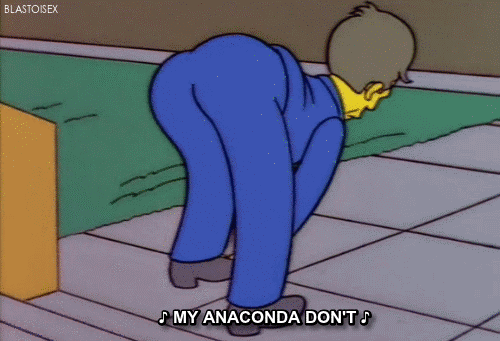11 Reasons Our Butts Are Much More Than Just Vessels For Twerking
Not just for shaking, slapping and sitting.
Cheek (n.) Originally referring to the jaw and fleshy wall of the mouth, Chaucer helped mutate the word in the late 13th century. It wasn't until the 1600s that it started to reference the butt directly.

Powerful and mesmerizing, our cheeks have been named the most powerful muscle group. Responsible for walking, sitting, standing and shaking what the good lord gave you, this muscle is not to be underestimated.
Bonus Butt Bit:
"A thousand men he [Samson] slow eek with his hond,
And had no wepen but an asses cheek."
- Chaucer, "Monk's Tale"
Tush (n.): An abbreviation of tuchus. Pushed its tush into our hearts in 1914.

It's a great hiding place. Well, we're assuming that from all of the findings that Dr. Frank Gaillard and other radiologists have found up people's tushes since he founded Radiopedia, a place for Radiologists to share findings and tutorials on extreme tuchus cases.
Rump (n.): Scandanavian in origin, meaning hind-quarters and buttocks of an animal. This rolly-polly term thumped into our lives in the mid-15th century.

Research shows that it's natural for women to carry more fat on their rumps due to higher levels of estrogen, as compared to men. Amen to a fat ass.
Spank (v.): Meaning to strike forcefully with an open hand, especially on the buttocks. First slapped into our lexicon in 1727.

Ass men and women everywhere, you have a new label: "pygophilia." It's the term that umbrellas those who are sexually aroused by butts. So, spank on pygophilias!
Heinie (n.): Also spelled heiney, origins unknown, but thought to come from the term hind end. Wiggled its way into our vocabulary in the 1930s.

You can get butt cancer! Even if you haven't exposed your heinie to the sun, melanoma can develop. Spread your cheeks to your partner more often and ask if you have any new freckles—then feel free to get freaky.
Arse (n.): Old English word aers meaning tail or rump; that mutated from the proto-Germanic word arsoz. This rump-shaker arrived on the scene in the late 14th century.

Studies have found women with bigger butts tend to be smarter. The fat stored around the hips and butt usually carry more essential omegas-3 fatty acids, which aid in brain growth. Fuck yeah, science.
Buttocks (n.): Thought to originate from the Old English word buttuc, meaning "end, short piece of land," late 13th century.

While butt-chugging isn't a typical first date topic, we here to spread awareness of the deadly trend. Since the butt booze doesn't have a chance to filter through the liver and kidneys, your plump buttocks doesn't have a way to tell you that you've had too much to drink.
Bum (n.): Thought to be onomatopoeic as other words of similar sound that mean swelling or protuberance. Bouncing into our conversations in the late 14th century.

Bum researchers at Oxford have found that fat storage on the thighs and butt can help prevent heart disease and diabetes. Another big bum advantage is that women with big hips are more likely to live longer because gluteofemoral fat is stored there. Thank you, thunder thighs and hips that don't lie.
Keister (n.): Perhaps transferred from a British dialect kist, meaning "safe, strongbox". It strongarmed its way into our vocab in 1931.

According to both a Men's Health and Women's Health survey, women prefer men to compliment their keister out of every other body part. Eyes and chest followed the down there dominator.
Moon (v.): In the 1600s it meant "to expose to moonlight," then molded in 1756 to mean, "the idea of pale circularity." The first recorded time it meant to flash someone your naked rump was in 1968.

Men get insecure about their big ol' moons, too. Around 10 percent of men get butt implants, according to what New York surgeon, Dr. Douglas Steinbrech told VH1. Boys, if you want to see your own juicy booty bounce, then we say go for it! ...Then please post the videos online.
Fanny (n.): Comes from American English, from earlier British meaning "vulva" back in 1879. Fanny farted its way into our lives in 1920.

Science says that we all fart on average 13 to 21 times a day. So break wind, my hot aired friends. Let your fanny air fly free. Too embarrassed? Don't be, check out these on-air loud and deadlies.
